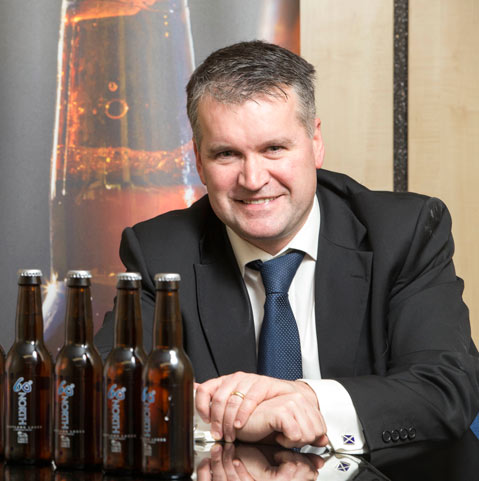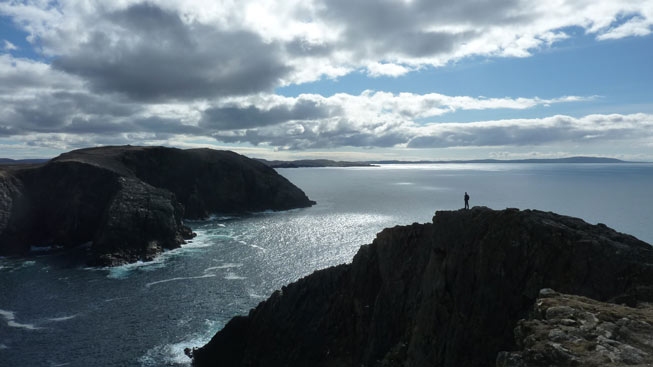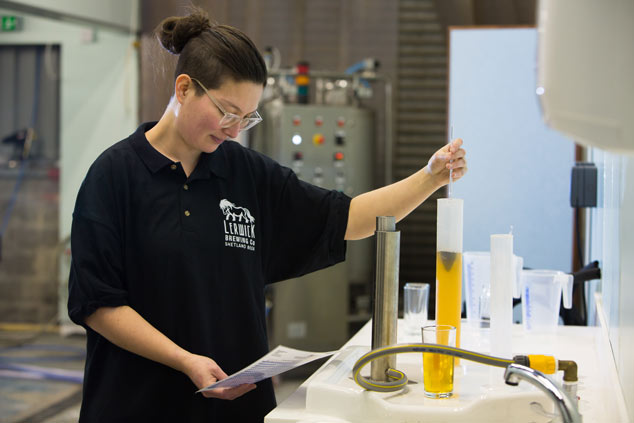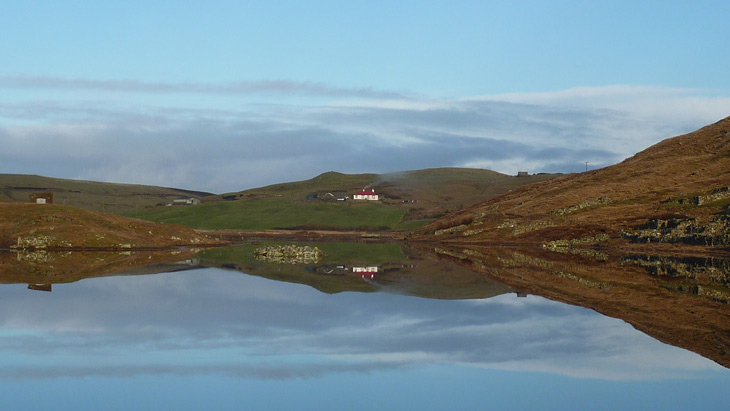We sit down with the man who heads up possibly the most extreme place of alcohol refinement in the UK, the Lerwick Brewery. And, when we say extreme – we’re talking about location, Graham’s firm is located about as far north as you can go in the UK, on the beautiful (and wind battered) Shetland Islands.
Lerwick’s unique climate, pure waters and cultural approach to brewing make for a different kind of drink. We ask Graham why he decided to get into brewing (the family business is actually in natural gas distribution), what it’s like brewing beer for football teams and how to deal with alien invasions…

Full name: Roderick Graham Mercer
Role: Director
DOB: 09/10/1969
Birthplace: Stirling
Twitter: @graham_mercer
Website: www.lerwickbrewery.co.
Fun Fact: “I turned down the opportunity to see Oasis at one of their first Scottish gigs in favour of going to see the Humpff Family. One of my big gig-going regrets – and why I never became an A&R man!”
I read that you guys originally started working together in the family business, Rearo, which was involved in laminated panels and natural gas, right? So, how’d you make the leap to brewing things?
It was my brother John who first mentioned the idea – many years ago he worked on the design of the cooling system in the Guinness Brewery in St James’s Gate, Dublin and he always retained an interest in brewing. So, before we knew it, we were installing equipment into our new plant in Lerwick and receiving our first order of hops. We’ve always been keen on the idea of having our own brewery – let’s be honest, who has never had that daydream?
You founded the brewery as a trio right, what was your part in the whole thing? Where did you get the original idea to start a brewery?
We are a Shetland family so knew that the islands have plenty of pure, fresh water and a perfect ambient temperature for brewing. I’ve worked with my brothers Jimmy and John for over 20 years and know we make a great team and a good professional fit. The decision to go ahead with the brewery was truly a joint one – we all had to be fully committed if we were to make this work.
What’s your role at the firm, could you give us an outline? Are you all involved in the brewing process, and does it need to be a ‘hands on’ type of thing?
As Distribution Manager I probably have one of the most challenging roles out of the three of us. Shetland is one of the most remote locations in the UK. We have the natural environment to make great beer but we are hundreds of miles from the UK mainland – for example, closer to Bergen than we are to Edinburgh and also affected by some very dramatic weather.
So, you can imagine the logistical challenges for us in sending cask, or even kegs, away hundreds of miles away and then trying to get them back. Luckily I have lots of experience of doing the same with gas, for our previous business, so I have lots of transferable knowledge. Whilst I’m doing that, Jimmy heads up the brewing side of things.

Could you outline the brewing process for us? What you need for it, how long it takes, what comes out, what you guys do differently? I read you guys use a more traditional process than a lot of other beers and lagers. How does that work and why do you do it?
A good beer can be made within a week, but a good craft lager takes much longer – around 6 weeks. We need to give it time to work its magic. Because of the pure water in Shetland we don’t have to use additives to clear our beer and lager – so there is no isinglass in our products, which is pretty unusual. Also, we take time over our processes to make sure that the taste is as good as it can be.
How hard is it to start a craft beer brewery (assuming you know what you’re doing, cos I don’t!). Is there a lot of red tape? A lot of financial risk?
There are responsibilities with setting up any food or drink business, and making and selling alcohol is no exception. However, following those procedures is a very important part of establishing a business which retailers and customers trust. We have had to invest more in capital expenditure because of our location.
Being such a long way from mainland UK meant that we needed to have our own bottling facility on Shetland. Again, this is quite unusual, as many breweries use contract facilities for bottling, so don’t have to make that investment into their own plant.
How does making a beer for a football team work? What was that like?
We’ve known the team at St Mirren for many years so approached them about the idea of brewing a branded beer for the Club. The initial design concepts were great and we could see that it was a very good way for them to grow and celebrate their ‘Buddie’ name. We’re delighted with the product and we have had terrific feedback from the supporters, who love it too.
Best of all, each bottle of Buddie sold makes a donation to their highly-acclaimed Youth Academy. It’s been fantastic bringing something from idea to finished product. This is certainly a model which we would be interested in applying to other clubs across the UK.
How do you develop and perfect the blend that goes into one of your drinks?
We use the most important thing that we have at our disposal – our local market. We have used the people of Shetland as a test market for these products and will continue to do so with new developments. Collaboration with the community is very important to us.

What’s Shetland’s drinking culture like? I read that most pubs are based in hotels and people like to drink at home with friends quite a lot?
That’s right. Hundreds of years of crofting has meant that the home is the heart of the Shetland community, and still is. Friends and family use the home as a basis for celebrations and gatherings of all kinds. There are also a wide range of community halls across the islands, used for bigger events.
Pubs are becoming more commonplace, but tend to be in Lerwick, the capital. With people spread across 10 islands and many tens of miles apart by road and sea, it’s not always easy to ‘pop to the pub’! The home still remains really important as a gathering-place.
Does the weather up there effect your brewing?
The climate on Shetland is fantastic for brewing. Ambient temperatures are perfect for brewing beer (rarely below 6 or above 12 degrees Centigrade), and our water supply is even more constant, rarely changing by more than a couple of degrees. Shetland is a great place to live and a great place to brew beer.
If you could go back to the beginning and start over, what would you change or do differently?
We’re just starting out as we only launched our beers last summer – so you might want to ask us again in a year!
What’s your ultimate aim and goal for the brewery? If you could achieve anything with it, what would you pick? Imagine money was no obstacle & shoot for the moon…
Our goals are very much about penetration of the market at the moment and, whilst that might sound pretty straightforward, you do have to make a huge investment if you are doing to be a high street brand. So when you say that ‘money is no obstacle’ our goal would be to be recognised as a leading beer brand from Lewis to Leeds; Haroldswick to Harlow; and Penzance to Perth – and part of the regular shop of a good chunk of the UK population. It would be great to have some export deals in place too, particularly with our Scandinavian cousins who have a strong affection for Shetland.
What was the biggest challenge that you’ve had to overcome so far and what did you learn from it?
Our location is our biggest opportunity but also our biggest challenge. We’ve had to be creative to get as far as we have. Sometimes it’s difficult to get people to deliver to Shetland and, for example, it took us ages to find equipment installers who would install the plant. We’ve sourced materials from all over Europe, not just the UK, to get around this – for example the bottling plant came from Italy.

What do you enjoy most and least about what you do?
I love the fact that the subject of beer excites pretty much everyone…
…it’s not difficult to sell the concept or the idea of the products. And everyone wants to talk about Shetland. The downside of the subject is that everyone wants either a free sample, or to come and work for us (as a beer taster). It’s great to have that level of interest, but it’s hard when you get so many requests for free product!
What’s Lerwick Brewery’s philosophy, summed up in a sentence?
We focus on delivering customers a consistently high-quality product with consistent performance in terms of delivery and customer service – providing the kind of beer they want to drink, not the kind of beer we think they should be drinking.
What advice would you give to aspiring food & drink entrepreneurs who’d want the kind of results that you’ve had?
Don’t feel like you’re on your own….
…make contact with fellow brewers and people in the industry. Everyone in the industry is so helpful – from the associations to brewers, suppliers and the wide range of companies involved in the industry – and they won’t hesitate to give you guidance where you need it.
We have not been short of advice since we set up. Everyone has been so helpful and open. There’s very little sense of competitiveness. Companies’ recipes, of course, remain closely-guarded secrets, but dos and don’ts and best practice are widely discussed. So do make the most of your fellow experts.
And we always ask three customary ridiculous questions…
If you had to employ any member of the Justice League of America to come and work with you guys at the brewery, who would you pick, and why?
It would have to be Aquaman, the superhero ruling the seas. He’d be perfect to help us. He could be the guardian of our special, soft water and make sure that supplies are protected to guarantee a plentiful supply of Shetland beer for generations to come.

If you were forced to fend off an alien invasion and singlehandedly save mankind using only the tools available at the brewery, how would you do it?
Easy. We’d take Shetland’s January weather and have it ready for when the aliens landed. Ten minutes in a force 10 gale with lashing rain and squally seas would see them off!
If you were forced to convert the brewery into some sort of scientific/technological research firm (again, assume a limitless budget and access to the best scientific talent in the world) – what would you call yourselves and what would your specialist areas of research be?
We would be called KEDI – the Keep ‘Em Dry Institute – and we would monitor the impact of rising seas on the UK [Ed: legit]. As the UK’s most northerly outpost, Shetland will be the first place to be affected by higher sea levels caused by melting Arctic ice. At KEDI we would make sure Shetland, as well as the rest of the UK, was prepared, of course with beer in hand…..
